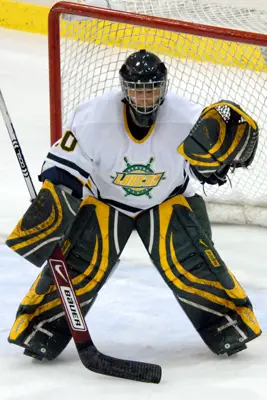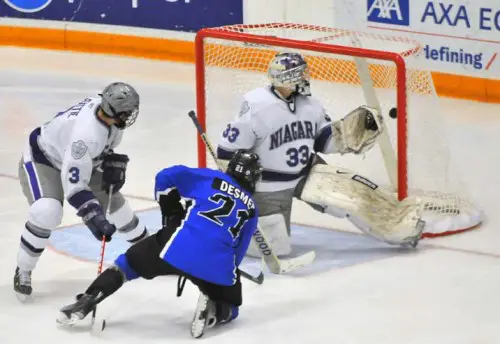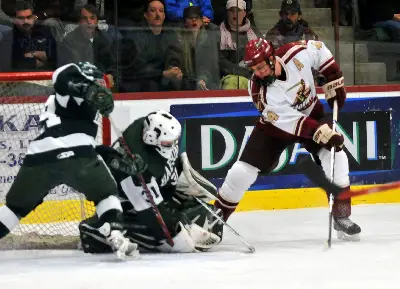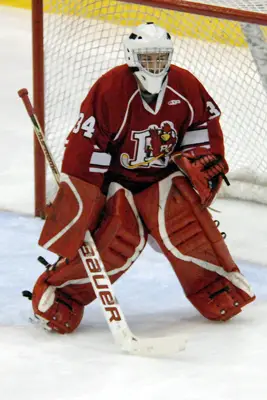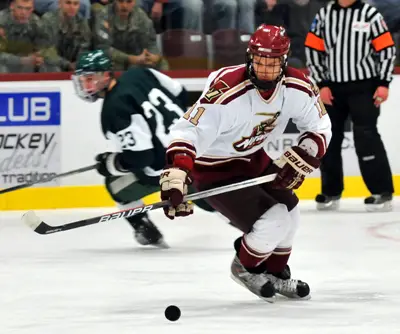The Name of the Game
Quick, what’s the bigger surprise? Michigan sweeping Michigan State in Munn last weekend, or ABBA being inducted into the Rock and Roll Hall of Fame before Patsy Cline? Before KISS? Before Heart, for the love of all that’s holy?
Let me make this clear: I am not anti-ABBA. In fact, I am very pro-ABBA. I just like to see the deserving get their due.
You know what, CCHA fans? Last weekend, the Wolverines were very, very deserving.
MSU coach Rick Comley knew. After UM completed the road sweep of the Spartans to advance to the CCHA championship tournament, Comley said, “We could have been at our best and maybe played our absolute best, and it may not have mattered, because Michigan played that well.”
The Wolverines looked invincible in Friday’s 5-1 win. “We were ready, we were focused, and we got rewarded,” said UM coach Red Berenson.
Saturday’s 5-3 game was a better contest, but the score is misleading. The Wolverines may have squandered an early two-goal lead in the first, but from the second period on, they were simply not going to lose. After that one, Berenson said that his team is peaking at the right time.
“Whether it’s a commitment to backcheck or a commitment to playing in your own zone without the puck, then we’re doing a better job of it now than we were at Christmas,” said Berenson, who likened his players to spoiled brats in the first half of the season. “The team,” he said, “has bought into doing what we have to do to win.”
With injuries to captain Chris Summers and starting goaltender Bryan Hogan, it’s possible that the Wolverines have finally found their rallying point very late in the season. The team I saw in Munn Arena is the team that I thought Michigan would be all season. They were incredibly fast, overwhelmingly physical, totally polished.
They were, in short, Michigan hockey.
Said Comley, “The only other team that we’ve seen that even comes close to that caliber — if they’re going to play like that — is Wisconsin. Even Miami, I don’t think, is as good as that team is playing right now.”
What remains to be seen is whether last weekend was the culmination of the Wolverines’ season or just one scary, excellent series that will extend their season even further than they expected.
Even though the UM coaches knew that their 19-year NCAA tournament appearance streak was on the line going into East Lansing last weekend — that probably their only shot to make the tourney is to win the Mason Cup — the coaching staff was completely focused on the CCHA tournament for its own sake.
“We never talked about getting in the [NCAA] tournament,” said Berenson. “All we talked about was [that] this weekend, we have to find a way to get to Joe Louis. That’s our season. That was it. There was no PairWise, there was no, ‘We’ve got to win one or two,’ or somebody else has to lose. I haven’t looked at any of that and I didn’t talk about it.
“This was not in our sights a month ago. We were fighting for seventh place.”
And now they’re fighting for more.
The Winner Takes It All
The CCHA tournament is becoming something of a predictable phenomenon. Sure, a few weeks ago it looked unlikely that Michigan would be playing in Detroit this weekend, but there couldn’t have been any doubt about Northern Michigan.
Berenson may be made of something magical, but NMU coach Walt Kyle is Rasputin Jr.; the Wildcats have made an appearance in Detroit in all but one year (2007) since Kyle became coach in 2002-03.
Miami should be in Detroit every year — not that missing the CCHA championship tournament last year hurt it in postseason. It’s quite something to lose your best-of-three home league playoff series, make the tournament, and play for a national championship. Given that they beat OSU in three games at home last weekend, I can think of only one possible outcome for the RedHawks in Detroit … in April.
This year, the only semi-familiar face is Ferris State. This is the fourth CCHA championship tournament appearance for the Bulldogs, who last made an appearance at the end of the 2002-03 season, a campaign that culminated in their first-ever NCAA playoff berth.
There are exciting times ahead this weekend.
No. 1 Miami
The top-seeded RedHawks won their passage to Detroit by beating Ohio State in three games last weekend, the only second-round series that went beyond two contests. This is Miami’s eighth attempt to capture a Mason Cup, a piece of hardware that has eluded the RedHawks in every one of their previous CCHA championship tournament appearances.
• Record: 26-6-7 (21-2-5-2 CCHA)
• Last 11 games: 9-2-1
• Goals scored per game: 3.51/9th nationally
• Goals allowed per game: 1.79/first
• Power play percentage: 18.4/33rd
• Penalty kill percentage: 87.3/4th
• Top scorer: Jarod Palmer (17-27–44)
• Top goal scorer: Palmer
• Top goaltender: Cody Reichard (.930 SV%, 1.64 GAA)
The RedHawks face a goaltending decision going into this weekend. While Reichard was their main guy for most of the season with an 18-3-3 record, Connor Knapp (8-3-4, .920 SV%, 1.96 GAA) won the deciding match against OSU Sunday to bring the RedHawks to Detroit.
Coach Enrico Blasi told the Dayton Daily News this week that he’s unsure of who will play heading into the weekend. “Sometimes the good Lord works in mysterious ways, because now he’s making us think again about what we’re going to have to do going down the stretch,” he said.
Having to reconsider who’s in net because both are so good is an enviable position. Miami has much else to make other teams jealous: five double-digit goalscorers, the top defensive corps in the country, a significant amount of passion.
There are two things that can hurt the RedHawks in Detroit, and each is tied to Miami’s embarrassment of riches. First may be a bit of overconfidence. This isn’t a criticism. The RedHawks had a relatively easy time taking the regular season, and even though they had to play three games against OSU, the players may chalk that up in their minds to the teams’ intense rivalry and the end-of-season desperation with which the Buckeyes played.
The second potential pitfall is that on-ice passion. Miami takes too many penalties. Period. Frankly, this may not be a problem in league play — but could be an issue in the NCAA tournament.
Otherwise, the RedHawks have all the ingredients.
No. 2 Ferris State
The Bulldogs became the No. 2 seed in this field after Michigan State lost two games to Michigan last weekend. That is not to say that the Bulldogs don’t deserve to be No. 2; MSU finished one win ahead of FSU, and the two teams volleyed for position all season long.
To get to Detroit, Ferris State swept Nebraska-Omaha in two games in Big Rapids last weekend. FSU led 3-0 in the first game until UNO’s John Kemp scored a late third-period goal to make it a 3-1 contest. Then the Bulldogs needed overtime Saturday to defeat the Mavericks. Casey Haines scored 23 seconds into OT to send FSU to JLA.
• Record: 21-11-6 (13-9-6-4 CCHA)
• Last 10 games: 4-3-3
• Goals scored per game: 2.97/27th nationally
• Goals allowed per game: 2.24/5th
• Power play percentage: 19.4/22nd
• Penalty kill percentage: 87.7/3rd
• Top scorer: Blair Riley (18-19–37)
• Top goal scorer: Riley
• Top goaltender: Pat Nagle (.927 SV%, 2.01 GAA)
Like the RedHawks, the Bulldogs have the luxury of two very good goaltenders. Nagle (12-8-3) had both wins last weekend, but Taylor Nelson (9-3-3, .915 SV%, 2.49 GAA) is equally capable.
Like the RedHawks, the Bulldogs have yet to win a CCHA playoff championship.
And, like the RedHawks, the Bulldogs have talent in every position … but perhaps FSU lacks Miami’s depth. The Bulldogs have three players who have netted more than 10 goals: Riley, Casey Haines (11-18–29) and Aaron Lewicki (12-11–23). FSU’s top five scorers — including Cody Chupp and Zach Redmond — have accounted for nearly half (48.7 percent) of the Bulldogs’ goals this season.
One more RedHawks comparison: the Bulldogs are scrappers, too. Like Miami, FSU takes penalties. This can be a drawback in Detroit when Ferris plays Northern, as the Wildcats have one of the best power plays in the nation.
FSU’s secret superpower going into the tournament is its defense, which has flown mostly under the radar this season. I’ve made no secret of my admiration of defenseman Matt Case, whose play this season portends a successful NHL career. A pair of sophomores, Brett Wysopal and Chad Billins, could become household names if FSU is successful in Detroit.
There are two things that may deride the Bulldogs in Detroit, other than penalties. First is the second-half slump that FSU is experiencing. Of the four teams in this field, the Bulldogs are the ones with the least momentum; their sweep of UNO last weekend ended a three-game winless streak.
Second is FSU’s play on the road. Fifteen of the Bulldogs’ 21 wins this season came in Ewigleben Arena.
No. 3 Northern Michigan
There’s something almost surreal about the Wildcats under the direction of Walt Kyle. They seem sleepy in the first half of the season and are just about to be counted out … and then they climb progressively through the second half, until they reach a peak at playoff time.
Now all they have to do is keep peaking. That’s been the hardest part.
Of the teams in this field, Northern Michigan is the hottest going into Detroit. Twelve of the Wildcats’ 19 overall wins have come since Jan. 1, and they’ve lost one game in their last 10.
Why? I don’t know. Some things — like Cheap Trick’s absence from the Rock and Roll Hall of Fame and goaltender Brian Stewart’s emergence from hibernation in the second half of each of his last three seasons — remain a complete mystery to me.
• Record: 21-11-6 (13-9-6-3 CCHA)
• Last 10 games: 8-1-1
• Goals scored per game: 3.03/t23rd nationally
• Goals allowed per game: 2.47/12th
• Power play percentage: 20.8/9th
• Penalty kill percentage: 84.2/16th
• Top scorer: Mark Olver (19-28–47)
• Top goal scorer: Olver
• Top goaltender: Brian Stewart (.927 SV%, 2.37 GAA)
Northern Michigan swept Alaska last weekend to advance to Detroit in a series that was only in question for a little bit in the first game. NMU went up 4-0 in that contest before UAF scored three to make it interesting, but Stewart had 32 saves in the game and 62 total on the weekend as the Wildcats outscored the Nanooks 9-4 while being outshot 66-44.
While NMU placed two players — forward Mark Olver and defenseman Erik Gustafsson — on the CCHA’s first team this season, the Wildcats are more than the sum of a few players. Seven different ‘Cats registered goals last weekend against Alaska with Gregor Hanson and Tyler Gron each netting two.
This is the third straight trip to the CCHA championship tournament for the Wildcats, and in each of their last two outings, the ‘Cats lost their semifinal contest and won the consolation game. Last year, they lost a tight 2-1 contest to Notre Dame. In 2007-08, they were up 3-2 over Michigan heading into the third but lost the game 6-4.
The one thing that NMU hasn’t been able to do in Detroit — obviously — is seal the deal. Each of those last two semifinal games was very different, but each betrayed an inability to push past a certain, intangible plateau; you could feel it as the games progressed.
This year, this Wildcats team is battle-tested. These juniors and seniors have been here twice before. That’s a real asset going into Friday’s match against Ferris State.
No. 4 Michigan
Last weekend, the Wolverines played like a team with nothing to lose, and they may have gained a second season by doing so. In UM’s two-game sweep of MSU, Michigan looked like the team with the better record, the better season — the better everything. The last part, certainly, was true enough.
If Kyle’s ability to take his team to Joe Louis Arena on the strength of second halves of seasons is surreal, then what about Berenson’s refusal to sit out this league dance? Berenson has some powerful mojo, and somehow he managed to convey it to his team just in the nick of time this season.
• Record: 23-17-1 (14-13-1-0 CCHA)
• Last 10 games: 6-4-0
• Goals scored per game: 3.27/15th nationally
• Goals allowed per game: 2.32/8th
• Power play percentage: 19.2/24th
• Penalty kill percentage: 86.3/7th
• Top scorer: Carl Hagelin (17-26–43)
• Top goal scorer: Louie Caporusso (18)
• Top goaltender: Shawn Hunwick (.908 SV%, 1.97 GAA)
I’ve already said quite a bit about the Wolverines elsewhere in this column. There are a few more things that need to be said going into Detroit, however.
Hunwick, a junior, took over in net when Bryan Hogan (18-15-1, 2.33, .901) was injured in the first period of UM’s 4-0 win over Notre Dame Feb. 25. Since then, he’s 4-1-0 (5-2-0 overall this season). His two wins last weekend were his fourth and fifth career starts.
With Hunwick in net — including the remainder of that first game against the Irish — the Wolverines have scored 27 goals in six contests. To put this in better perspective, UM scored 25 goals in the month of February, in nine games; the Wolverines have netted 21 in four games in March.
“I think once I got in there against Notre Dame, maybe they thought they had to make up for me a little bit because I didn’t have experience,” said Hunwick. “The guys started working hard — back-checking, blocking shots. It was quick for them to realize that, you know, you play D, you’re going to probably score more goals. The offensive output from our team in the last five or six games that I’ve been in has been great.”
Another thing that cannot be overstated about Michigan is how the team is playing as a team. If they continue to do so, the Wolverines may just play themselves into the NCAA tournament this weekend.
The Loser Standing Small
After the Spartans lost their home series against the Wolverines last weekend, Comley said, “I like this team and I think everybody likes the future.”
I think that’s a fair assessment. The Spartans were rebuilding from the dismal 2008-09 season and were loaded with underclassmen achievers in 2009-10. MSU had a good first half of the season — full of the youthful enthusiasm that made them so much fun to watch — and then struggled since the start of the calendar year, with just five wins since Jan. 1.
“What I want to go back and analyze is that we were 14-6-2 at one point, and then went 5-7 and something,” said Comley. “Was it difficulty of schedule, or what stopped? We scored more early than we did late. Those are things I need to answer.
“I think in the end, we’re still missing a couple of pieces, especially offensively. We spent the first two weeks after Christmas and everything before Christmas just kind of playing, and then all of a sudden you’re playing with a purpose and for a reason and with a consequence, and that’s where I think young kids start to tighten up a little bit.”
As tough as it was to lose two to end their season at home against the Wolverines, the Spartans — much like Captain Kirk — need their pain.
“You have to suffer losing,” said Comley. “You have to have the pain of losing, but you also have to understand that there’s always something to build on.”
A Sense of Expectation Hanging in the Air …
So, how many CCHA teams will head to the NCAA tournament? According to this week’s Bracketology, four: Miami, Ferris State, Northern Michigan and Alaska.
Alaska, you say? Why, yes. The Nanooks — who lost their second-round playoff series on the road to Northern Michigan last weekend — are still in the NCAA mix at No. 13 in the PairWise. I don’t pretend to understand all the permutations that can keep them or knock them out, but I do know that UAF stands a good chance of making the tournament if there isn’t much movement ahead of them.
I think.
There is still a long-shot hope for the Spartans to make the tournament. Jayson Moy, my pal and USCHO Bracketology guru, provided the entire scenario semi-privately for a mutual friend who has something of a vested interest in MSU making the NCAA tourney, but such an eventuality would require more than a few twists.
Possible? Yes. Likely? Um, no.
Memories … Good Days … Bad Days …
For those who follow Buckeyes hockey, living through the first 30 hours after Miami beat Ohio State Sunday night were a little like waiting for the other shoe to drop. Tuesday — after what was literally years for some, days for others — it did.
On Tuesday, Ohio State announced that it would not be renewing the contract of coach John Markell, who had been at the helm in Columbus since he took over for Jerry Welsh toward the end of the 1994-95 season before being named head coach in 1995-96. Markell’s record at OSU was 280-267-56.
Markell called the news “an obvious disappointment.” That’s more than just an understatement. In the more than 15 years that I have known John Markell, I have known him to be absolutely devoted to OSU’s hockey program.
For years, fans have been calling for his departure because the hockey program hasn’t been consistently successful. I have to agree that OSU — a big school with a proud and very public athletic tradition — needs a strong hockey program. College hockey also needs OSU to be strong to help raise the profile of the sport. Markell was not able to deliver that consistency, and so I understand the decision to let him go.
But I lived in Columbus for Markell’s first 13 full seasons, so I got to know him a little better than many people did. Markell endured much unearned and mean-spirited criticism from people who didn’t know how much he cared about his student-athletes. He was as devoted to their progress as he was to the progress of the program — even to those players who openly disliked him. John Markell and I had many frank, off-the-record talks about many players he coached. He was often criticized for appearing cavalier or capricious about his players, but he sincerely cared more about those young men than most people would believe.
He’s a smart, caring man and a good coach. Was he the right coach for OSU? Not anymore, sadly. No.
OSU associate athletic director Chris Schneider said Tuesday, “What we were looking for in our men’s hockey program is one that is consistently successful, consistently competing for collegiate championships, and ultimately competing in the NCAA tournament.”
Schneider went on to praise Markell for doing “very good things” with Ohio State’s student athletes. “He has done some good things with our program in the past. Again, this goes back to being a consistently successful program. One that is consistently competing for conference championships.”
OSU assistant captain Sergio Somma said that the team has mixed feelings about Markell’s departure. “We have had a good relationship with John and it has been good for me and a lot of other guys. It is kind of bittersweet. At the same time, it can be a new positive. You have to take the positive out of it is, it will be a new, fresh start for guys and with that it brings a lot of energy. It is a good parting.”
Somma expressed the same concern that I have, that for assistant coaches Steve Brent and JB Bittner.
“We don’t know if Bits or Brenner will be back with the new head coach,” said Somma. “With the youth and energy and obviously, both coach Brent and Bits played here, so they bring that passion to the program that is authentic. You can’t really fake that. So that is something that you are going to really miss if they go there separate ways.”
Bittner and Brent were both captains of the team. They’re fine men and excellent coaches. Brent’s wife gave birth to their second child in December.
For fans, college hockey is a passion, to be sure. For coaches and other staff, it’s a passion — and a job, and a way of life, and the lives of many, many people.
First Jim Culhane and now John Markell. And now three CCHA teams, including BGSU, conducting national searches for new head coaches. Already, the 2010-11 season looks very different.
Breaking Up Is Never Easy, I Know
True, but given what he told Ohio State before he became a Buckeye, this shouldn’t surprise anyone.
As I finish this column, there’s word on the virtual street that OSU forward Zac Dalpe will forgo his final two seasons in Columbus to play for the Albany River Rats of the AHL.
Before he came to OSU, there was speculation that Dalpe would go pro. He told the program that he’d be a Buckeyes player only if Markell remained as coach.
Markell’s gone. That’s some easy math.
Dalpe, a finalist for CCHA player of the year, will be missed. The Paris, Ontario, native was chosen by the Carolina Hurricanes as the 45th pick overall in the 2008 NHL Entry Draft.
Dalpe will be missed for more than his on-ice talent. Sure, it’s easy to like his 21 goals this season and his 70 career points (34-36–70) in his first two years at OSU. It is also just plain easy to like Dalpe. He’s the kind of kid who has enormous talent, a sense of humor, and an easy manner.
But I Think You Know That I Can’t Let Go
Well, I can certainly let a thing ago, but sometimes it requires a little clarification.
Last week, I questioned the logic of some of the picks for all-league teams, especially when those picks seemed at odds with the nominees for year-end individual awards. When I did so, I was remiss in telling fans why these things happen.
Let me make this clear: I wasn’t indicting the CCHA for the picks. I was taking issue with the guys in the league I love the most. Well, the guys I love as much as the on-ice officials — the coaches.
The coaches do all the voting for the all-league teams and season-end honors. After 15 years of covering college hockey, I’m still not sure I know how coaches think. All season long, nearly every coach I spoke with said that MSU defenseman Jeff Petry was a dominant player on the ice. “A factor,” was a phrase used after many games. Arguably “the best defenseman,” was another I heard often.
Petry was a CCHA second-team honoree this season, but is one of the three finalists for best defensive defenseman.
OK.
So for those of you playing along at home, it’s not the league itself who makes these choices; it’s the coaches.
And it’s one more thing I don’t pretend to understand.
You Can Dance, You Can Jive
It’s amazing what winning can do for the mood of a team.
After Michigan beat Michigan State in the first game last weekend, UM captain Chris Summers clowned it up with the media, who were interviewing Louie Caporusso. Summers took out his cell phone and thrust it into the mix of recorders in front of Caporusso and conducted an interview of his own. This is how it went:
Summers: What’s the team mentality right now in the locker room?
Caporusso: It’s good. We’re pretty confident right now, and that’s always a good place to be. We’re just going to work it from here … (trails off into laughter).
Legitimate Reporter: Do you think you played a little bit better without your captain?
Caporusso: No, we miss our captain. We love our captain.
Caporusso, a pro, didn’t miss a beat.
Then when I talked with Shawn Hunwick about his newfound fame, he said, “I’d like to say that I don’t like it, but it’s not that bad.”
As for Hunwick’s stature (and what is the fascination with goalie height, anyway?), I can absolutely report that Hunwick is taller than 5-foot-5 — unless he was wearing lifts, and I saw no evidence of that.
Yes, I looked.
Bye Bye Doesn’t Mean Forever
We’ll see you along the road, Mavericks. The CCHA will miss you.
Thanks for helping to elevate the game of college hockey, and good luck in the WCHA.
USCHO Arena Reporter J. Justin Boggs and Buckeye Sports Bulletin writer Jeff Svoboda contributed quotes to this week’s column.
